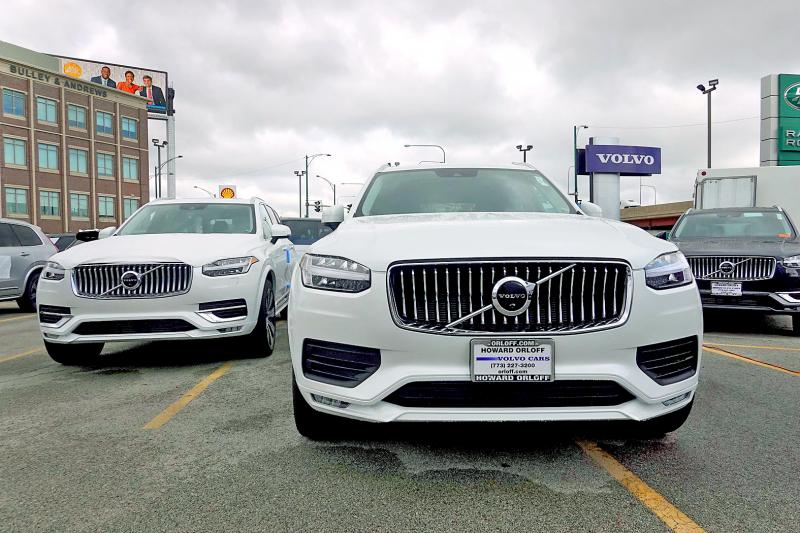Swedish automaker Volvo Cars Group AB on Monday said that it plans to raise at least 25 billion kroner (US$2.9 billion) by selling shares to fund its electric vehicle (EV) transformation strategy.
Volvo Cars and its parent company, Chinese automaker Zhejiang Geely Holding Group Co (浙江吉利控股), have applied to hold an initial public offering (IPO) on the NASDAQ Stockholm, with shares expected to start trading before the end of the year.
The money raised from the IPO is to help fund Volvo’s lofty ambitions.

Photo: AFP
The company aims to nearly double sales by 2025 to 1.2 million vehicles, half of which are to be battery electric vehicles, and wants its entire lineup to be all electric by 2030.
“We’re going to be the fastest in the business to transform to electrification — 2030 no more combustion cars. And that’s just one part,” Volvo Cars chief executive officer Hakan Samuelsson said in an interview.
Volvo Cars’ plans also include selling more directly to customers and it aims to have half of all sales come from online channels by the middle of this decade.
“All of that costs a lot of money,” Samuelsson said. “So that’s why we are now doing a primary issue of new shares to secure equity for that transformation next year.”
Most of Volvo Cars’ current lineup is made up of plug-in hybrid and so-called mild-hybrid models. Battery electric vehicles account for only a small fraction of the total sold.
Volvo is based in Goteborg, Sweden, but has been owned since 2010 by Geely, one of China’s biggest independent automakers, which bought it from Ford Motor Co for about US$1.8 billion.
The company is moving ahead with the share sale even as a shortage of semiconductors has crimped global auto production.
The shortages are likely to persist to at least the end of the year, Volvo Cars chief financial officer Bjorn Annwall said.
However, because the crunch is being felt across the vehicle industry, automakers can get away with selling pricier models or offering fewer rebates for fatter profit margins, which more than makes up for lower sales.
“From a financial perspective, this shortage of semiconductors is not such a big issue,” Annwall said. “Of course, some customers have to wait longer than we’d like to get the cars delivered. And so it’s a problem, but it’s a problem we have now learned to live within and we don’t see an improvement extremely short term.”
Volvo’s sales tumbled last month, falling 30 percent to 47,223 from the year before, monthly sales figures released on Monday showed.
Annwall said the problem was less to do with chip supplies and more because of COVID-19 lockdowns in Southeast Asia that temporarily shut its suppliers’ factories, leading to general component shortages.

Sweeping policy changes under US Secretary of Health and Human Services Robert F. Kennedy Jr are having a chilling effect on vaccine makers as anti-vaccine rhetoric has turned into concrete changes in inoculation schedules and recommendations, investors and executives said. The administration of US President Donald Trump has in the past year upended vaccine recommendations, with the country last month ending its longstanding guidance that all children receive inoculations against flu, hepatitis A and other diseases. The unprecedented changes have led to diminished vaccine usage, hurt the investment case for some biotechs, and created a drag that would likely dent revenues and

Global semiconductor stocks advanced yesterday, as comments by Nvidia Corp chief executive officer Jensen Huang (黃仁勳) at Davos, Switzerland, helped reinforce investor enthusiasm for artificial intelligence (AI). Samsung Electronics Co gained as much as 5 percent to an all-time high, helping drive South Korea’s benchmark KOSPI above 5,000 for the first time. That came after the Philadelphia Semiconductor Index rose more than 3 percent to a fresh record on Wednesday, with a boost from Nvidia. The gains came amid broad risk-on trade after US President Donald Trump withdrew his threat of tariffs on some European nations over backing for Greenland. Huang further

CULPRITS: Factors that affected the slip included falling global crude oil prices, wait-and-see consumer attitudes due to US tariffs and a different Lunar New Year holiday schedule Taiwan’s retail sales ended a nine-year growth streak last year, slipping 0.2 percent from a year earlier as uncertainty over US tariff policies affected demand for durable goods, data released on Friday by the Ministry of Economic Affairs showed. Last year’s retail sales totaled NT$4.84 trillion (US$153.27 billion), down about NT$9.5 billion, or 0.2 percent, from 2024. Despite the decline, the figure was still the second-highest annual sales total on record. Ministry statistics department deputy head Chen Yu-fang (陳玉芳) said sales of cars, motorcycles and related products, which accounted for 17.4 percent of total retail rales last year, fell NT$68.1 billion, or

Macronix International Co (旺宏), the world’s biggest NOR flash memory supplier, yesterday said it would spend NT$22 billion (US$699.1 million) on capacity expansion this year to increase its production of mid-to-low-density memory chips as the world’s major memorychip suppliers are phasing out the market. The company said its planned capital expenditures are about 11 times higher than the NT$1.8 billion it spent on new facilities and equipment last year. A majority of this year’s outlay would be allocated to step up capacity of multi-level cell (MLC) NAND flash memory chips, which are used in embedded multimedia cards (eMMC), a managed